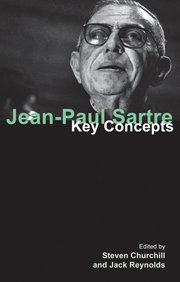Book contents
- Frontmatter
- Contents
- Contributors
- Acknowledgements
- Note on abbreviations
- 1 Introduction: Sartre vivant
- 2 Life and works
- Part I PSYCHOLOGY, PSYCHOANALYSIS AND LITERATURE
- 3 Sartre and Husserl's Ideen: phenomenology and imagination
- 4 Sartre's understanding of the self
- 5 Contingency and ego, intentionality and nausea
- 6 Sartre: novelist and playwright
- 7 Psychoanalysis and existential psychoanalysis
- Part II ONTOLOGY: FREEDOM, AUTHENTICITY AND SELF-CREATION
- Part III ETHICS AND POLITICS
- Bibliography
- Index
4 - Sartre's understanding of the self
from Part I - PSYCHOLOGY, PSYCHOANALYSIS AND LITERATURE
- Frontmatter
- Contents
- Contributors
- Acknowledgements
- Note on abbreviations
- 1 Introduction: Sartre vivant
- 2 Life and works
- Part I PSYCHOLOGY, PSYCHOANALYSIS AND LITERATURE
- 3 Sartre and Husserl's Ideen: phenomenology and imagination
- 4 Sartre's understanding of the self
- 5 Contingency and ego, intentionality and nausea
- 6 Sartre: novelist and playwright
- 7 Psychoanalysis and existential psychoanalysis
- Part II ONTOLOGY: FREEDOM, AUTHENTICITY AND SELF-CREATION
- Part III ETHICS AND POLITICS
- Bibliography
- Index
Summary
Sartre's metaphysics are borne out of phenomenological investigations into the emotions, the imagination, and particular phenomena that are revelatory of ontological truths, such as the famous experience of La Nausée (Sartre 1938, 1965a) in which the novel's protagonist, Roquentin, experiences the fundamental difference characterizing the way of being of things from what it is to be a conscious being (Sartre 1965a: 182–3). This chapter aims to present how, from this basic insight and the theory of consciousness that accompanies it, Sartre develops an understanding of the self. In the first part of the chapter I will focus largely upon The Transcendence of the Ego (Sartre 1936–7, 2004c). In the second part I examine how Being and Nothingness contributes to this task. Although largely expository, the chapter will make some critical comments, because identifying the weaknesses of a theory is a precondition for properly grasping its strengths.
Sartre's early theory of the ego
The phenomenological investigations that are illustrated so powerfully in Sartre's novels, and La Nausée in particular, provide building blocks for a theory of consciousness that has direct implications for the understanding of the self who is conscious. With Roquentin's experience, Sartre is clearly drawing attention to the fact that consciousness cannot be viewed as a way of being that is comparable to that which we are, in normal circumstances, familiar with in our environment.
- Type
- Chapter
- Information
- Jean-Paul SartreKey Concepts, pp. 32 - 43Publisher: Acumen PublishingPrint publication year: 2013

